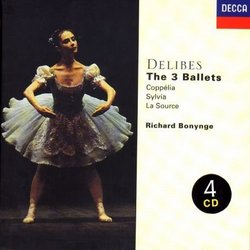| All Artists: Leo Delibes, Richard Bonynge, National Philharmonic Orchestra, New Philharmonia Orchestra, Royal Opera House Covent Garden Orchestra Title: Delibes: The 3 Ballets Members Wishing: 0 Total Copies: 0 Label: Decca Release Date: 11/9/1999 Album Type: Box set Genre: Classical Styles: Ballets & Dances, Ballets Number of Discs: 4 SwapaCD Credits: 4 UPC: 028946041826 |
Search - Leo Delibes, Richard Bonynge, National Philharmonic Orchestra :: Delibes: The 3 Ballets
 | Leo Delibes, Richard Bonynge, National Philharmonic Orchestra Delibes: The 3 Ballets Genre: Classical
|
Larger Image |
CD Details |
CD ReviewsGreat performances of the under-rated ballets David A. Hollingsworth | Washington, DC USA | 11/22/1999 (5 out of 5 stars) "Not only are the ballets under-rated and obscured, Leo Delibes (1836-1891) continued to be forgotten figure in French Romantic music. Whereas Piotr Illyich Tchaikovsky of Russia, his near contemporary, was the instrumental force in the development of ballets after the mid 19th century, so was Delibes. His ballets, especially Sylvia (to which Tchaikovsky greatly admired) continued to be popular until the 1920s, when productions of these works decreased noticeably. Recordings therefore play an important role of allowing us to explore and appreciate the "hidden treasures." What is even more wonderful is that rival complete recordings of these works are now available (except La Source, which is still under one recording). The three ballet compilation was taken from previously recorded works under Bonynge on separate 2-disc sets (Bonynge recorded Sylvia twice, one with the National Philharmonc and the other with the Swiss Romande Orchestra, both equally well played, with polish, passion, and affection).Richard Bonynge, always a pioneer in recording neglected works of composers (like Offenbach, Lehar, Strauss, Adam, and so forth), brough out the passion and discipline from his orchestras in this entire 4-compact disc set. The National Philharmonic (with Coppelia), the New Philharmonia (with Sylvia), and the Orchestra of the Royal Opera House (with La Source) provided us with sparkling, affectionate performances. The compilation is well done with the recording sound very realistic and natural (and sparkling as well).The other complete recordings of the ballets, such as those featuring Dorati/Fistoulari in the Mercury Living Presence Recordings (3 CD set) or Zinman under Philips (in Coppelia) or Mogrelia under Naxos (in Sylvia) are also well done. However, Boynynge has the upper hand in the emotionism and excitement he and his orchestras were able to bring out, although Dorati/ Fistoulari were not far behind. Furthermore, the London Decca compilation of the ballets offers us the best overall sound surrounding the performances of the ballets. The London Decca recordings are most effective in bringing out the vividness Delibes' ballets require. the recordings are just simply fresh and natural. Extremely well done.Highly recommendable and an obvious first-choice! (although the Dorati/Fistoulari recordings are close runner ups while the others are not too far behind).Well, think hard." Great performances of very good music. D. R. Schryer | Poquoson, VA United States | 12/25/1999 (4 out of 5 stars) "Leo Delibes had a special talent for writing captivating ballet music. Tchaikovsky, the greatest ballet composer of all, was an ardent admirer of Delibes' ballets. While Coppelia is Delibes' masterpiece, both Sylvia and La Source are worthy compositions. You will never hear these works performed better than in these recordings by Richard Bonynge -- THE oustanding conductor of 19th century stage and programmatic music. This set is both a bargain and a treat." Some serious competition for Tchaikovsky ATP | Santa Monica, CA United States | 06/25/2003 (4 out of 5 stars) "Tchaikovsky's music often seems to dominate the world of ballet. But it's worth remembering that Tchaikovsky himself admired Delibes, whose work elevated music for the ballet to new heights.
Coppelia is the best known and most often performed of the Delibes ballets. It's easy to see why: the mazurka is lively, the czardas stirring. The music for the mechanical dolls has a wonderful music-box quality, and the melodic waltz of the hours is every bit as memorable as Tchaikovsky's waltz of the flowers. Sylvia is seldom performed in its entirety, but the pizzicatti is instantly recognizable. Balanchine added the Sylvia pas de deux to his production of Coppelia, an interpolation that is often copied. (An oddity of ballet history: Coppelia was performed en travesti, with women taking the men's parts - hence Coppelia has no pas de deux of its own.) La Source was originally created as a kind of musical contest, with half written by Delibes and half by Minkus. This album includes the full score, so you can judge for yourself why Delibes stayed in Paris and Minkus went to Russia. My only criticism is the awkward way the three ballets are divided among four CDs. But conductor Bonynge has a definite flair for 19th century music. He has done us all a favor by putting full-length versions of all three Delibes ballets in this boxed set." |

 Track Listings (20) - Disc #1
Track Listings (20) - Disc #1